Engine Block Remanufacturing
Below are the 14 steps we use in our engine block remanufacturing process. You can scroll down to view all steps or use the drop box to go directly to a particular step. Pressing the red arrow buttons will bring you back to the top of the page.
Step 1) Engine Block Disassembly
All blocks are visually inspected for casting defects prior to their disassembly and the beginning of engine block remanufacturing. The parts are then removed and individually inspected for damage and cause of failure. The oil and water passage plugs are removed to insure optimum results during the thermal cleaning process.
Only premium castings are used for our marine blocks, all castings are replaced in all salt-water applications. Our high performance engines are built with premium cores. In many applications new castings are used, as we never employ repaired castings or sleeved blocks. To retain your classic car's original block casting, Promar employs the artistry of our skilled casting repair technicians.
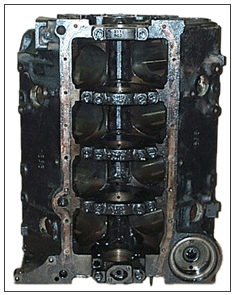 Dirty Engine Block
Dirty Engine Block
Step 2) Engine Block Thermal Cleaning
The thermal cleaning system gives our customers the closest thing to a new casting, taking engine parts to a whole new level of clean. The heaters emit uniformly controlled heat, which is evenly distributed throughout the chamber. This method totally eliminates the concentration of intense heat or flame entering the chamber, which could overheat, warp or melt parts. The load is heated to 650-800 F (340-427C) in an oxygen deficient atmosphere, where the combustible hydrocarbons decompose and parts leave the oven completely dry. This baking process used on cast iron blocks only employs the Ace RKE 230 oven. Ash residue is easily removed by stainless steel shot blasting which is the next step of our engine restoration services.
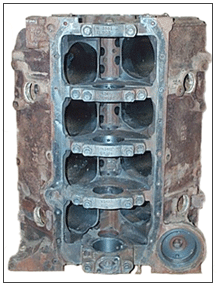 Oven-Cleaned Engine Block
Oven-Cleaned Engine Block
Step 3) Engine Block Shot Blasting
Our shot-blasting machine employs a cleaning method using stainless steel shot. This finishing process is used by Promar to remove surface contamination such as rust and irregularities from engine blocks during remanufacturing. The result of this method is a cleaner smoother surface finish to make easy the detection of surface and subsurface casting defects during quality inspection.
To insure stress free casting, the peening process is used to impart compression strength to metal parts. This is accomplished by metal shot pellets acting like miniature ball peen hammers as they strike the entire surface of the block. All iron castings are put through this process before a preliminary inspection for defects is done. This process using the AR HB41 is employed for cast iron blocks only and facilitates a more accurate magnetic particle inspection.
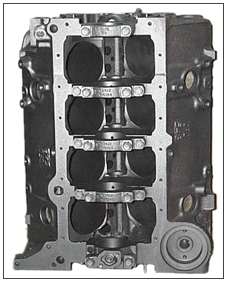 Engine Block After Shot Blasting
Engine Block After Shot Blasting
Step 4) Engine Block Magnafluxing
Magnetic particle inspection is the most definitive method of detecting cracks and imperfections in any ferrous engine parts. This procedure, as part of our engine restoration services, assures the highest quality cast iron blocks. The next process is pressure testing, but first, let us explain how aluminum blocks are cleaned, pressure tested and checked for casting defects.
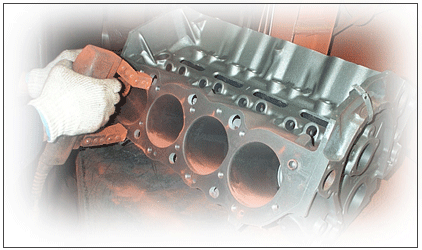 Engine Block Crack Detection
Engine Block Crack Detection
Step 5) Engine Block High Pressure Wash
The first stop for a qualified aluminum engine block during remanufacturing is our AXE SW20 OS spray cleaning system. With twice the spraying power and a dramatically increased number of multi integrated spray nozzles, this state of the art system assures Promar that all oil, dirt and foreign material is removed from even the smallest of oiling holes. Cleanliness of the aluminum engine block is essential to insure an accurate inspection. This process is used on all aluminum engine blocks as a first step prior to the second step of ultrasonic cleaning.
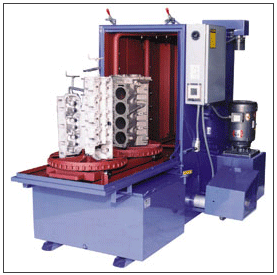 AXE SW20 OS Spray Cleaning System
AXE SW20 OS Spray Cleaning System
Step 6) Engine Block Sonic Cleaning
Promar's second process in the cleaning of aluminum blocks is the ultrasonic cleaning method, long known as the "benchmark" in cleaning and engine restoration services. Hundreds of specifications reference an ultrasonically cleaned part as the ultimate target for cleanliness. Ultrasonic cavitation is able to clean right down to the surface of a part and beyond. It is also able to reach internal areas, which are not accessible by using other cleaning means including spray and mechanical agitation. The forceful nature of ultrasonic energy provides the physical "push" required to break the mechanical and ionic bonds that hold very small particles to surfaces. Once cleaned the block is sent for pressure testing.
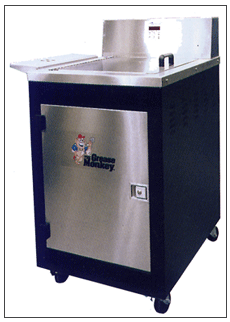 GMC 1818B Ultra Sonic Cleaner
GMC 1818B Ultra Sonic Cleaner
Step 7) Engine Block Pressure Testing
Promar uses the Delta Pressure tester to double check for pin holes after magnafluxing and dye testing are completed. Cracks and defects not detected during the first process are found at this time. This second process insures the integrity of all castings used in Promar products.
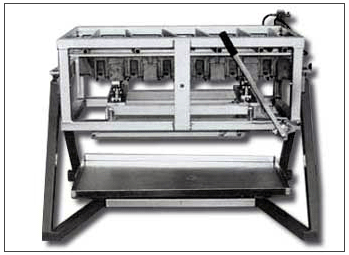 Delta 6000 Pressure Tester Machine
Delta 6000 Pressure Tester Machine
Step 8) Engine Block Preparation
A complete visual inspection of the block is performed. Repairs will be made to minor casting defects, removal of broken bolts are performed as well as repair and tapping of threads. Gasket surface repairs are performed to minimize stock removal. The next step of engine block remanufacturing is align honing.
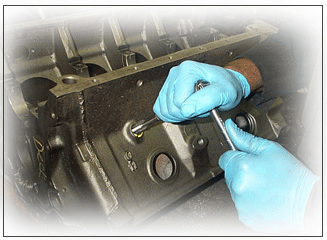 Engine Block Preparation
Engine Block Preparation
Step 9) Engine Block Machining
Promar engines continued its commitment to excellence when we purchased the RMC CNC V40 enclosed machining center. This machine is fully computerized and is equipped with a 24 pocket arm style automatic tool changer. The RMC V40 is a very fast, accurate and versatile machine for all of our engine block and general machining needs. This machine has a wireless probe that automatically identifies the block, levels the block, measures deck heights & cylinder bore sizes. This computerized probe takes all operator error out of the setup process.
Promar uses this machine to resurface the decks through the milling process, bore the cylinders, chamfer the top of the cylinders, as well as line boring blocks and cylinder heads with our 90 degree boring head. With position repeatability within .0001", there is no machine more accurate than ours. When milling a block it is essential to acquire proper Ra finish for each block. This machine is set up to automatically determine Ra finish based on the type of block, be it aluminum or cast iron, and by the type of gasket used for each specific application. When milling we utilize CBN (cubic boron nitride) cutters, which are second in hardness only to a diamond. The surface finish is then checked by using the Mitutoyo SJ-301. The Mitutoyo SJ-301 is utilized twice, once after resurfacing and again before final assembly Promar insures proper measurement of Ra by using the SJ-301.
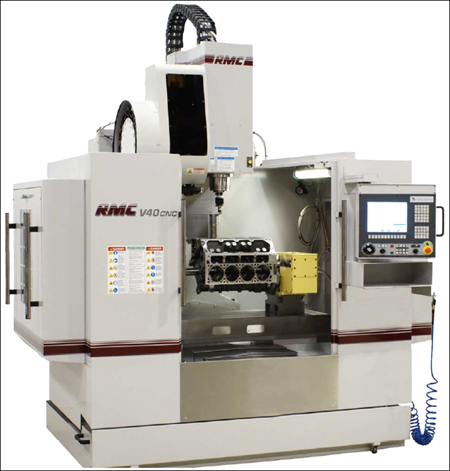 RMC V40 CNC Machine
RMC V40 CNC Machine
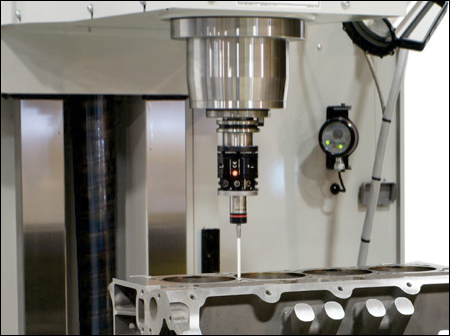 RMC Digital Probe
RMC Digital Probe
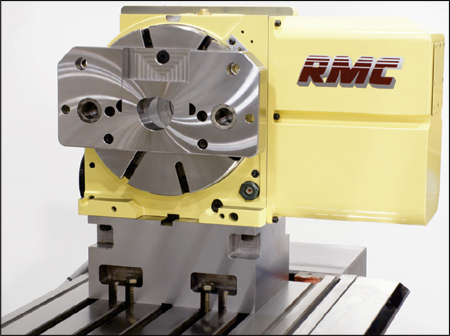 RMC 360° 4th Axis Rotary Table and Block Fixture
RMC 360° 4th Axis Rotary Table and Block Fixture
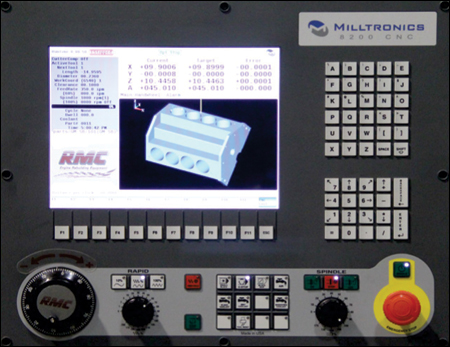 8200 CNC High Speed Machining Control
8200 CNC High Speed Machining Control
Step 10) Engine Block Rod Reconditioning
The ideal equipment for precision rod reconditioning and pin fitting is the Sunnen LBB-1600 Hone, which measures accuracy within .0001". This hone method is preferred all over the world for its ability to produce a round and straight honed bore equal to or better than the manufacturer's new rods.
All high performance engines are fitted with ARP high strength bolts and nuts prior to rod reconditioning. Once reconditioning of the rods is accomplished the next step of engine restoration is honing of the cylinders.
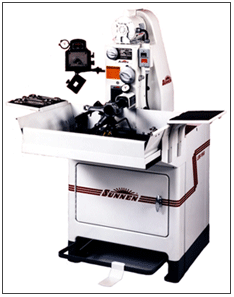 Sunnen LBB-1600
Sunnen LBB-1600
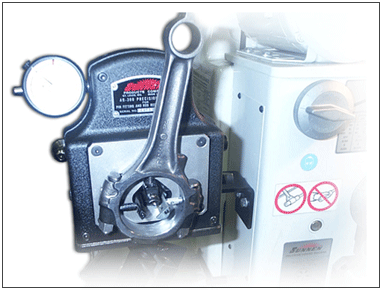 Connecting Rod Bore Checking Process
Connecting Rod Bore Checking Process
Step 11) Engine Block Honing
Promar Engines continues to keep their name as the best engine builder in the business. Promar is the first company in the world with Rottler's newest cylinder honing machine. We have upgraded from Sunnen's SV-10 honing machine to Rottler's H85AXY fully automatic high production diamond cylinder honing machine, which is unlike any other honing machine in the industry. This machine is the most accurate honing machine available with cylinders finishing within .0001" roundness and straightness. This automatic honing machine takes any potential operator error out of the equation. Rottler's H85AXY allows you to select desired cross hatch angle for a perfect finish for all applications. It also allows for sensitivity control and stone wear. As the machine hones, it shows the profile of the bore graphically as it continuously analyzes the bore and senses taper anywhere in the cylinder - top, middle or bottom and automatically dwells or short strokes as programmed, correcting the tight area. As engines continue to get more complex, oil clearances and machining tolerances continue to become even more critical. The only way to keep up with evolving engine designs is to use every piece of technology available to us. There is no question why Promar continues to be the best remanufactured engine in the industry. Make sure your engine block is machined by the best machine available, you won't be disappointed.
Promar insures proper measurement of RA by utilizing the Mitutoyo SJ-301 twice, once after honing and again before final assembly. Final assembly and completion of engine block remanufacturing is not started until all blocks go through a final wash.
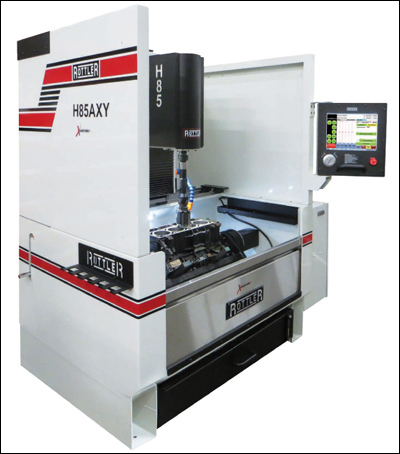 Rottler H85AXY CNC Honing Machine
Rottler H85AXY CNC Honing Machine
Step 12) Engine Block High Pressure Wash
Following these precise machining procedures and engine restoration services, our blocks undergo a second high pressure wash cycle to guarantee the removal of any debris that may have adhered or become dislodged during the machining process. Absolute cleanliness is necessary for the next step, which is final assembly. After the blocks receive a final wash we clean all parts ultrasonically.
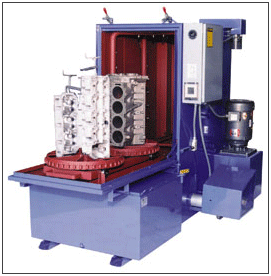 AXE SW 20-OS
AXE SW 20-OS
Step 13) Engine Block Sonic Cleaning
Promar's second process is ultra sonic cleaning of all parts old and new prior to assembly of the engine. This Ultrasonic Cleaning Method is long known as the "benchmark" in cleaning. Hundreds of specifications reference an ultrasonically cleaned part as the ultimate target for cleanliness. Ultrasonic cavitation is able to clean right down to the surface of a part and beyond. It is also able to reach internal areas, which are not accessible by using other cleaning means including spray and mechanical agitation. The forceful nature of ultrasonic energy provides the physical "push" required to break the mechanical and ionic bonds that hold very small particles to surfaces. Once the parts are cleaned, they are now ready to be assembled in our Promar engine.
 GMC-1818B Ultra Sonic Cleaner
GMC-1818B Ultra Sonic Cleaner
Step 14) Engine Block Assembly
At Promar there are no assembly lines during engine block remanufacturing. All engines are custom built. Each assembler does a visual inspection of the block, heads, crankshaft and all-inclusive parts prior to assembly. The Ra tester is used to check all cylinder bores, crankshaft journals and gasket surfaces. All parts such as crankshafts, bearings, cylinder bores, pistons, rings, connection rods, main saddles, lifter and camshaft bores are miced for proper size.
Each block is fitted with new full circle cam bearings, oil restrictors, relief valves, new water and oil plugs. The crankshaft is fitted in the block with new high quality bearings and each journal clearance is checked with plastigage, torqued and double-checked. New rings are then fitted in each bore to assure proper end gap. Each new piston is checked for proper clearance in each bore. The rings are installed on the piston and assembled into the bores. Each assembly is supplied with new high quality bearings and each journal clearance is checked with plastigage, torqued and double-checked. A new camshaft is then fitted into cam bearings bores and all new timing components are installed and double-checked by an assembly manager.
Cylinder heads are then installed with new head bolts and new Felpro or Victor head gaskets. The block now receives new lifters, push rods and rocker arms which are adjusted and a second check completed by an assembly manager. Each cylinder is then accurately checked for seal integrity to assure no compression or water leaks. At this point the engine is primed with special lubricant and a new oil pump. The residual parts of the gasket set are sent along with the engine. The assembly manager then conducts the final inspection of the engine.
All engines come with an installation manual. Bulletins about your specific engine are also enclosed in the packaging. Promar engines are secured onto a wooden pallet where vulnerable parts are protected from damage by corner covers. The entire block is wrapped in a durable plastic sheath to protect your engine from outside elements.
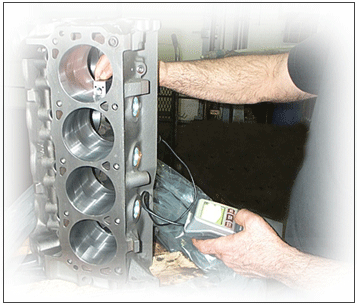 Engine Block Check
Engine Block Check
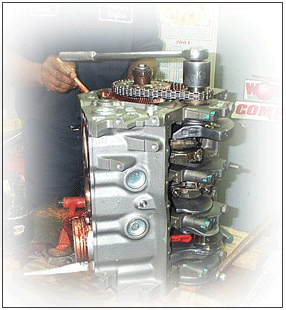 Engine Block with Crankshaft Installed
Engine Block with Crankshaft Installed
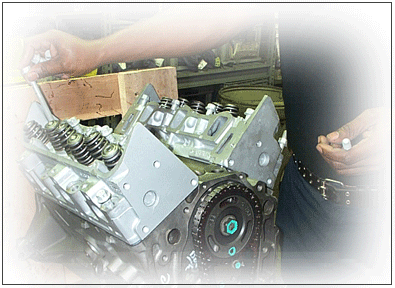 Engine Block with Cylinder Head Installed
Engine Block with Cylinder Head Installed
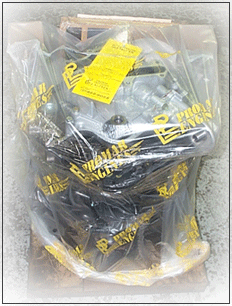 Completed & Wrapped Engine Block
Completed & Wrapped Engine Block